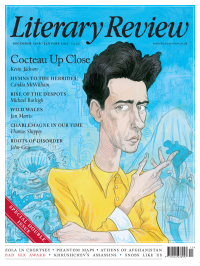Fergus Fleming
All Over the Poyais
The Phantom Atlas: The Greater Myths, Lies and Blunders on Maps
By Edward Brooke-Hitching
Simon & Schuster 256pp £25
Maps are perpetually fascinating. Ostensibly their purpose is to clarify, but to anyone with a grain of imagination they are a source of wonder. Who has not, at one time or another, placed a finger on a page and asked themselves: what is it like there? It need not even be somewhere exotic. To aficionados of cartography the words ‘Old Gasworks’ have almost the same allure as ‘Here Be Dragons’. The same spirit of enquiry underpins Edward Brooke-Hitching’s excellent book The Phantom Atlas. But with one important difference: here it is not the reader whose imagination wanders but that of the map makers themselves.
The Phantom Atlas is subtitled ‘The Greatest Myths, Lies and Blunders on Maps’. This does not do it full justice. In reality it summarises the combination of bewilderment and hope that both spurred and bedevilled humankind’s attempt to chart the world. Arranged alphabetically in fifty-eight short chapters, with

Sign Up to our newsletter
Receive free articles, highlights from the archive, news, details of prizes, and much more.@Lit_Review
Follow Literary Review on Twitter
Twitter Feed
It wasn’t until 1825 that Pepys’s diary became available for the first time. How it was eventually decrypted and published is a story of subterfuge and duplicity.
Kate Loveman tells the tale.
Kate Loveman - Publishing Pepys
Kate Loveman: Publishing Pepys
literaryreview.co.uk
Arthur Christopher Benson was a pillar of the Edwardian establishment. He was supremely well connected. As his newly published diaries reveal, he was also riotously indiscreet.
Piers Brendon compares Benson’s journals to others from the 20th century.
Piers Brendon - Land of Dopes & Tories
Piers Brendon: Land of Dopes & Tories - The Benson Diaries: Selections from the Diary of Arthur Christopher Benson by Eamon Duffy & Ronald Hyam (edd)
literaryreview.co.uk
Of the siblings Gwen and Augustus John, it is Augustus who has commanded most attention from collectors and connoisseurs.
Was he really the finer artist, asks Tanya Harrod, or is it time Gwen emerged from her brother’s shadow?
Tanya Harrod - Cut from the Same Canvas
Tanya Harrod: Cut from the Same Canvas - Artists, Siblings, Visionaries: The Lives and Loves of Gwen and Augustus John by Judith Mackrell
literaryreview.co.uk